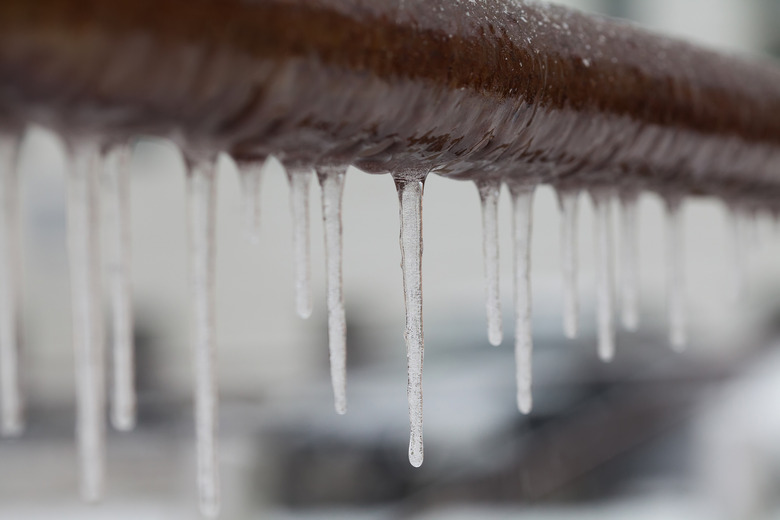How To Calculate Freezing Point
Everyone has had the experience of dealing with something frozen. Perhaps you have even been witness to watching ice slowly form on the surface of water when the temperature is cold enough or watching ice replaced by water when the temperature is sufficiently warm.
Different liquids – water, rubbing alcohol, cooking oil and so on – experience phase changes at different temperatures. That is, water moves between solid (frozen) and liquid at one temperature, rubbing alcohol at another and similarly for other liquids.
A solid becoming a liquid is called melting; a liquid becoming a solid is called solidification or freezing. To calculate freezing and melting points of mixed substances is complex, and you may even be able to test them yourself, whereas you can look up the freezing points of common substances in online tables.
What Are Freezing and Melting?
What Are Freezing and Melting?
Before exploring the phenomenon of freezing in particular, it is helpful to review what is meant by phases and phase changes.
Most substances can exist as a solid, a liquid or a gas if the temperature (and sometimes the pressure) is sufficiently altered. Water is a rare substance in that it can exist as both a solid and a liquid at temperatures that are relatively comfortable for humans, while reaching the gas state at a temperature that, while dangerous, is not especially extreme for humans (100 °C or 212 °F).
As already noted, melting is a change from solid to a liquid and freezing (or solidification) is the reverse. A liquid becoming a gas is called boiling, which everyone has seen. The opposite process is known as condensation. Rarely, a solid can "skip" the liquid phase and become a gas (sublimation), or the reverse can occur (deposition).
What Affects Freezing and Melting Points?
What Affects Freezing and Melting Points?
If you mix blue and yellow paint together in equal amounts, you get a result that looks green. If you use mostly blue or mostly yellow, though, the resulting color is "tilted" toward the color you used more of and to an extent that scales with the imbalance of ingredients.
The freezing points of mixtures of different liquids, or of liquids with solids dissolved in them, change in accordance with the properties of the constituents in a similarly predictable way. Water has a relatively high freezing point for a liquid because its hydrogen bonds more readily "lock into place" than do those of, say, ethyl alcohol (CH2CH3OH), which has a freezing point of –114 °C or –174 °F.
When a substance is dissolved in liquid, the solid that dissolves is called a solute and liquid is termed a solvent. The resulting solute-liquid mixture is called a **solution.** Whenever solute is added to a solvent, the freezing point of the solvent becomes lower.
Freezing Point of NaCl Solution
Freezing Point of NaCl Solution
When table salt (sodium chloride) is dissolved in water, it lowers the freezing point in water. This explains why you see trucks busily salting the roads in cold climates after a winter rainfall: It lowers the temperature at which water forms ice on the road.
Also, the lowering of freezing point of a solvent by adding solute is called a colligative property, meaning that the number of molecules the solute breaks into, not its chemical composition, determines the extent of the freezing-point depression. NaCl breaks into two atoms, the ions (charged atoms) Na+ and Cl- . The addition of a substance that yields three "pieces" per solute molecule would depress freezing point by an even greater amount than NaCl.
Freezing Point Calculator
Freezing Point Calculator
You can look up the freezing points of a host of common liquids in Celsius, Fahrenheit and Kelvin using an online calculator. Try to reconcile what you know about the chemical structure of the simpler ones with their freezing points to see if you can spot any patterns.
Cite This Article
MLA
Beck, Kevin. "How To Calculate Freezing Point" sciencing.com, https://www.sciencing.com/calculate-freezing-point-5154355/. 1 February 2020.
APA
Beck, Kevin. (2020, February 1). How To Calculate Freezing Point. sciencing.com. Retrieved from https://www.sciencing.com/calculate-freezing-point-5154355/
Chicago
Beck, Kevin. How To Calculate Freezing Point last modified March 24, 2022. https://www.sciencing.com/calculate-freezing-point-5154355/
